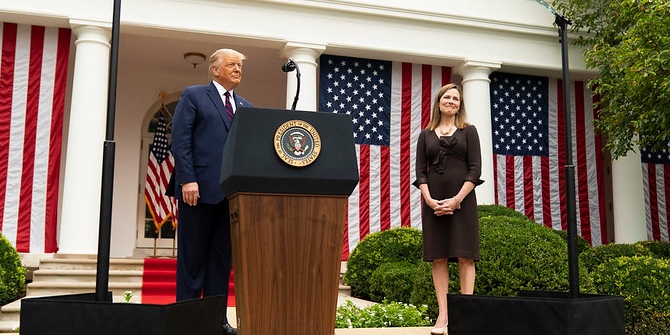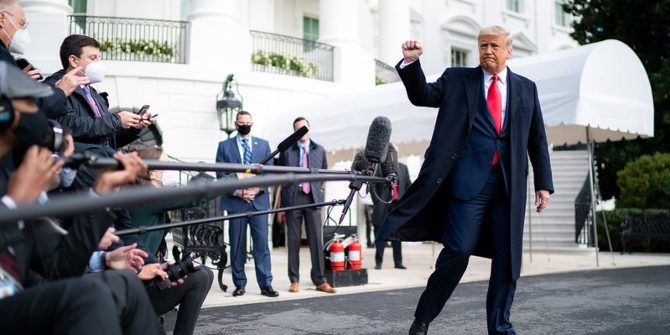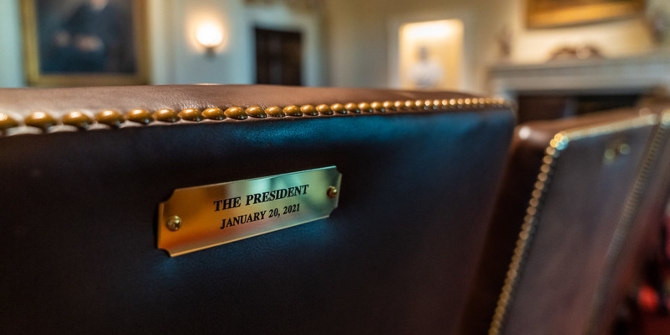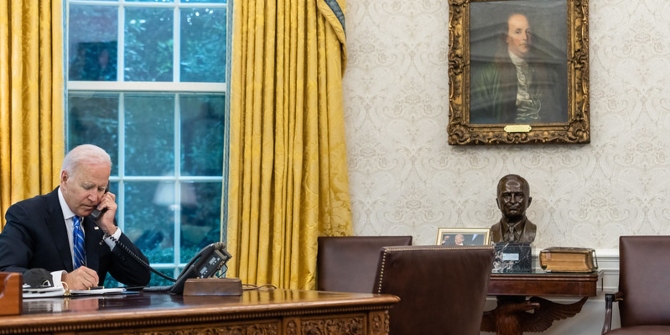 Last night the Democratic nominee, former Vice President, Joe Biden met Republican President Donald Trump for the first 2020 presidential debate in Cleveland, Ohio. In this Q&A Julie Norman writes that rather than a debate on the issues, what the American public witnessed last night was 90 minutes of insults, devoid of any meaningful policy discussion.
Last night the Democratic nominee, former Vice President, Joe Biden met Republican President Donald Trump for the first 2020 presidential debate in Cleveland, Ohio. In this Q&A Julie Norman writes that rather than a debate on the issues, what the American public witnessed last night was 90 minutes of insults, devoid of any meaningful policy discussion.
What happened at last night’s presidential debate?
American politics has had ugly moments, but Tuesday’s ‘debate’ between President Donald Trump and former Vice President, Joe Biden, was a new low, with ninety minutes of interruptions and insults, void of almost any meaningful policy discussion. With just over a month until the election, an estimated 100 million viewers were expected to watch last night’s debate, one of the few opportunities to hear both candidates speak to the issues in a year in which traditional campaigning has been mostly sidelined due to the COVID-19 pandemic. Instead, potential voters got what analysts across the spectrum are describing as a “train wreck,” a “disgrace”, and a “dumpster fire”.
What were the key moments?
During a segment on racism and urban violence, Trump refused to condemn white supremacists and armed militia members, describing the violence in recent protests as a left-wing problem, “not a right-wing problem.” When pressed on the far-right group, the Proud Boys, he responded with “stand back and stand by,” comments that have been embraced on social media by members of the group as an endorsement rather than a denunciation. Trump appealed to some moderates over the summer with his law and order messaging around recent protests. But failing to condemn violence and distance himself from far-right groups in the debate won’t win him many moderate voters, and his comments will only further escalate already tense protests.
In the final segment of the debate on “election integrity,” Trump again fuelled the conspiracy that mail-in voting was leading to widespread fraud, with unsupported claims that ballots are being sold by postal workers or dumped in rivers. Reiterating these claims, however unsubstantiated, has the real risk of deterring voters (including notably by some of Trump’s potential supporters) and undermining faith in American elections more broadly.
As for Biden, he seized the opportunity to distance himself from some on the left, pushing back on criticisms that he would be a vessel for the progressive wing of the party. When goaded by Trump on the point, Biden stated firmly, “I am the Democratic Party right now,” adding that, “the platform of the Democratic Party is what I approved of.” At the same time, Biden still failed to clarify his position on issues such as adding more justices to the court or abolishing the filibuster, potentially frustrating both moderates and liberals alike. It’s not the strongest politics, but with a lead in the polls, Biden is hoping that a light-touch response is his best bet in holding together a wide coalition of voters.
Who won the debate?
Though hardly a stellar performance from Biden, he mostly held his own against Trump’s relentless barbs and should maintain his lead in the polls. He was strongest when he looked at the camera rather than Trump, speaking directly to the American people with his signature empathy. Trump’s insurgent performance meanwhile may play well with his solid base, but won’t appeal much to moderate voters beyond his core.
What’s next?
There are two more presidential debates scheduled for 15 and 22 October, as well as a vice presidential debate between Vice President Mike Pence and Senator Kamala Harris on for 7 October. In the meantime, we can expect to hear more about the Supreme Court confirmation hearings, Trump’s tax returns, and the ongoing crises of the pandemic, the economy, and protests that have roiled an already contentious election year.
- Featured image credit: Håkan Dahlström (Flickr, CC-BY-2.0)
Please read our comments policy before commenting.
Note: This article gives the views of the author, and not the position of USAPP– American Politics and Policy, nor of the London School of Economics.
Shortened URL for this post: https://bit.ly/36iisxw
About the author
 Julie Norman – University College London (UCL)
Julie Norman – University College London (UCL)
Dr Julie Norman (@DrJulieNorman2) is a Senior Teaching Fellow in the Department of Political Science at University College London (UCL), and a researcher at UCL’s Centre for US Politics (@CUSP_ucl).






